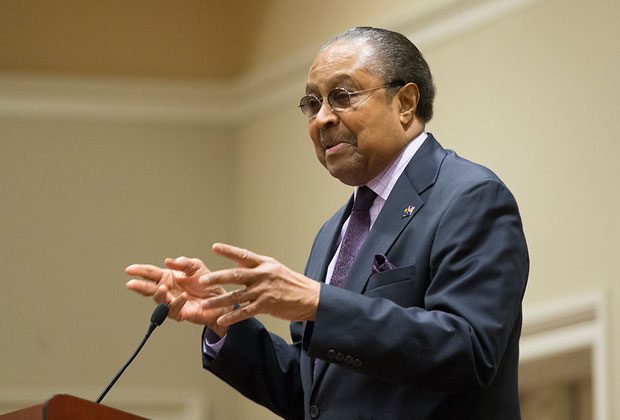A dream continued, a legacy remembered

More than 50 years after Martin Luther King, Jr. gave his famed “I Have a Dream” Speech on the steps of the Lincoln Memorial the United States still has a long way to go in terms of racial relations and equality.
So says Clarence B. Jones, who served as political advisor and speechwriter to Dr. King during the Civil Rights Movement.
In a Monday lecture titled “King’s Legacy: Challenge for the 21st Century” given in Younts Conference Center, a week after MLK Day, Jones discussed the current obstacles to racial equality in the United States and what we as a country must do to improve.
The presentation, co-sponsored by the Student League for Black Culture, the Furman chapter of the NAACP, the Cicero Society, and the Upcountry History Museum, began with an introduction by Furman President Carl Kohrt, Ph.D., who recapped Jones’ success as both a lawyer and Wall Street businessman, being twice recognized as Fortune’s Business Man of the Month.
Yet, in spite of his extensive career in assisting King and maintaining the legacy of the Civil Rights Movement, according to Jones, there is still much to do.
“We have to develop a commitment to the pursuit of excellence,” he told the audience, a mix of Furman students and people from within the Greenville community. “Silence and inaction in the face of injustice is the worst thing we could ever experience.”
Jones recalled his own reluctance in joining the movement for racial equality. As a young lawyer living in Los Angeles, he initially turned down King’s offer to serve as his legal counselor. It wasn’t until a few days later, when he heard King speak at rally, that he changed his mind.
“I call that day the making of a disciple,” said Jones.
According to Jones, the reluctance he felt decades ago is the same reluctance that is holding back the perpetuation of King’s legacy and the continuation of the fight for racial equality in the United States.
“People need to have their minds refreshed,” he said. “We can be better than this.”
For Jones, revamping the movement for racial equality begins on a community scale and, more importantly, through education, especially for young African Americans.
“Many black children see their only option as rapping a lyric or dribbling a ball,” he said. “Your realistic option is reading, writing, and arithmetic.”
Through education, says Jones, young African Americans will not only become of aware of King’s legacy, they will embody it.
“Knowledge is power,” he says.
“We owe so much to the legacy of this man that it is incumbent that we honor it.”